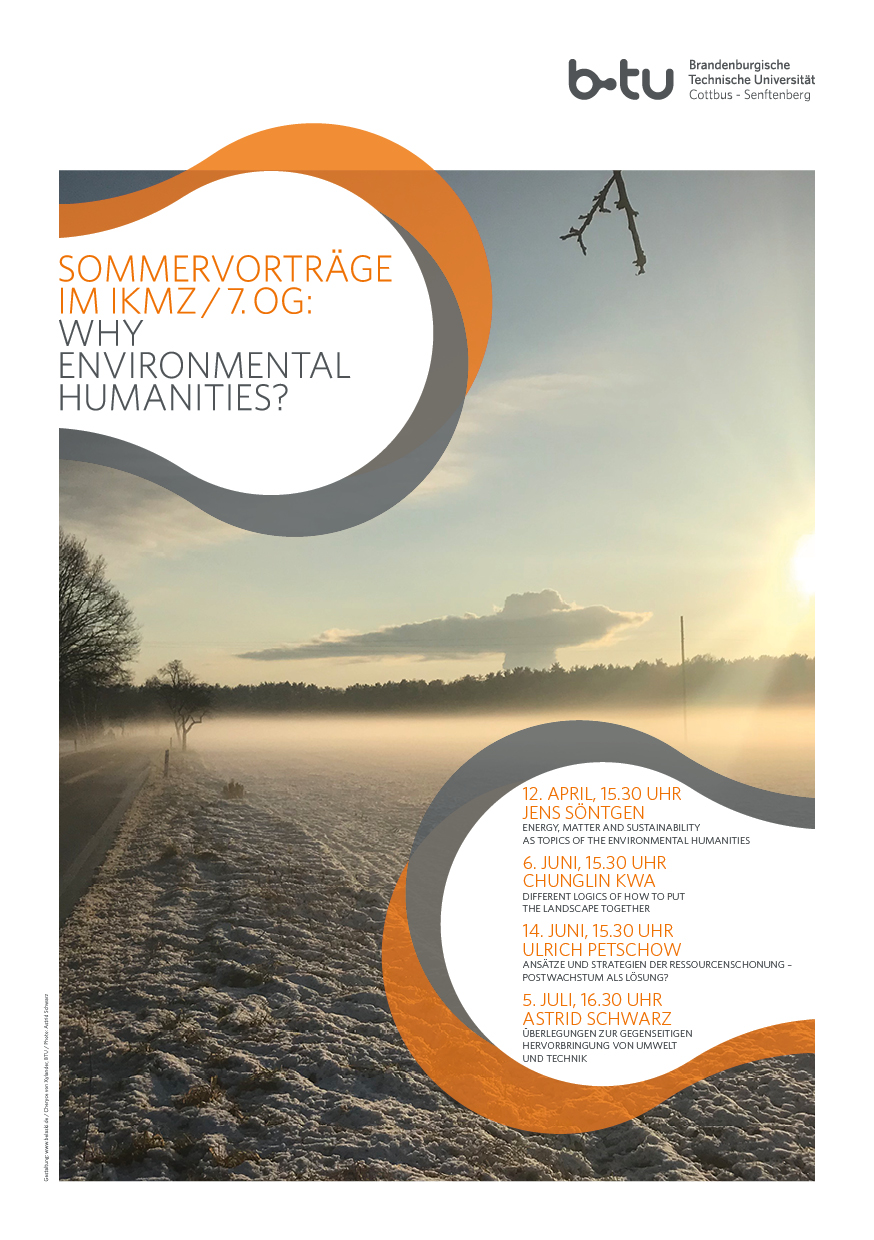Why Environmental Humanities? | Veranstaltungen | Sommersemester 2018
Jens Soentgen
Generally, energy and matter are seen as being topics of the natural sciences, one could even argue that they create their identity. In contrast, this presentation will show that research on energy and matter in humanity studies and social sciences is of vital importance for our understanding of the ecological crisis. What is more, this type of knowledge is not only significant to a better understanding of our environments and their transformations, but also stimulates new ways of acting. Different approaches will be presented to underline these claims, pertinent topics are humanity studies of energy systems and energy transitions, stories about materials ("Stoffgeschichten"), and the history of sustainability.
Chunglin Kwa
The landscape is usually taken as a holistic entity. Various landscape elements are put together to form a meaningful or functional whole. However, when aerial photography developed in the 1920s, a new concept of the landscape emerged. Seen from the air, the landscape appears as fragmented, consisting of patches of a different kind, like meadows, groves and hedges. When standardly made images of large stretches of land became available, the patchy landscape acquired a status of being “mechanically objective”. Geographers who relied on the aerial images opposed themselves to a certain school of ecologists, which was particularly strong in Germany: plant sociology. This school preferred to study the vegetation on the ground. Yet they also recognized that the landscape was patchy. But they identified the patches in a different manner: not visually, but emanating from simple numerical methods. They held up a different kind of an objective research ideal to the geographers of the aerial pictures. Reflecting on the debate between geographers and ecologists will give us an entrance into what the landscape is: as a cultural object and as a scientific object.
Ulrich Petschow
Die Diskussion um die „planetaren Grenzen“ der Ressourcennutzung verdeutlicht, dass eine weitrechende Minderung der Ressourcennutzung (Quellen und Senken) erforderlich ist. Den umweltpolitischen Ansätzen der Vergangenheit, die vor allem auf Effizienz setzten ist es nicht gelungen eine Entkopplung von Ressourcennutzung und Wirtschaftswachstum zu erreichen. Vielmehr ist bislang festzustellen, dass Rebound-Effekte eine höhere Effizienz der Ressourcennutzung zumindest z. T. wieder in Frage stellen. Mithin wird nach Strategien Ausschau gehalten, wie diese Senkung der Ressourcennutzung erreicht werden kann. In den vergangenen Jahren hat der Diskurs um Postwachstum und neue Modelle des Wirtschaftens an Relevanz gewonnen. Im Rahmen des Vortrags wird eine kritische Bewertung der unterschiedlichen Strategien und Instrumente vorgenommen wird.
Astrid Schwarz
Technik und Umwelt sind, ähnlich wie Sprache und Kultur, unverzichtbar für die Bestimmung des Weltverhältnisses von Menschen. Sie sind kein Supplement und auch kein Additiv, sondern die Bedingung der Möglichkeit überhaupt sich zur Welt in Beziehung zu setzen. Wir gestalten und bewegen uns in technisierten Welten, die uns zur Umwelt geworden sind und umgekehrt ein gestalterisches Potential entfalten. Die Ausrufung des Anthropozän vor noch nicht zwei Jahrzehnten rückte die Radikalität und Totalität dieses Vorgangs in den Blick. Gefragt ist nun die Entwicklung eines möglichst umfassenden Verständnisses und angemessener Lebensformen, dafür wird sowohl numerisch-kalkulatives wie hermeneutisches Wissen gebraucht. Welche Faktoren sind im neuen Spiel der Relationen wichtig, wie ist das Beziehungsgefüge von Technik und Umwelt zu denken und auf welche Weise sind konkrete Lebenswirklichkeiten verstrickt.

